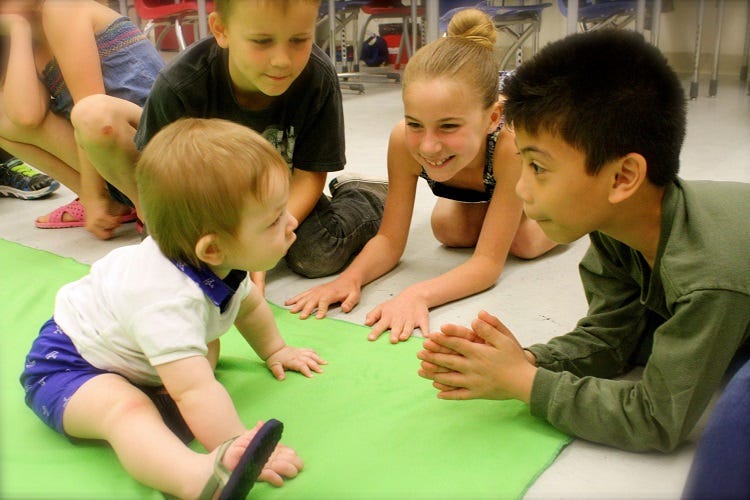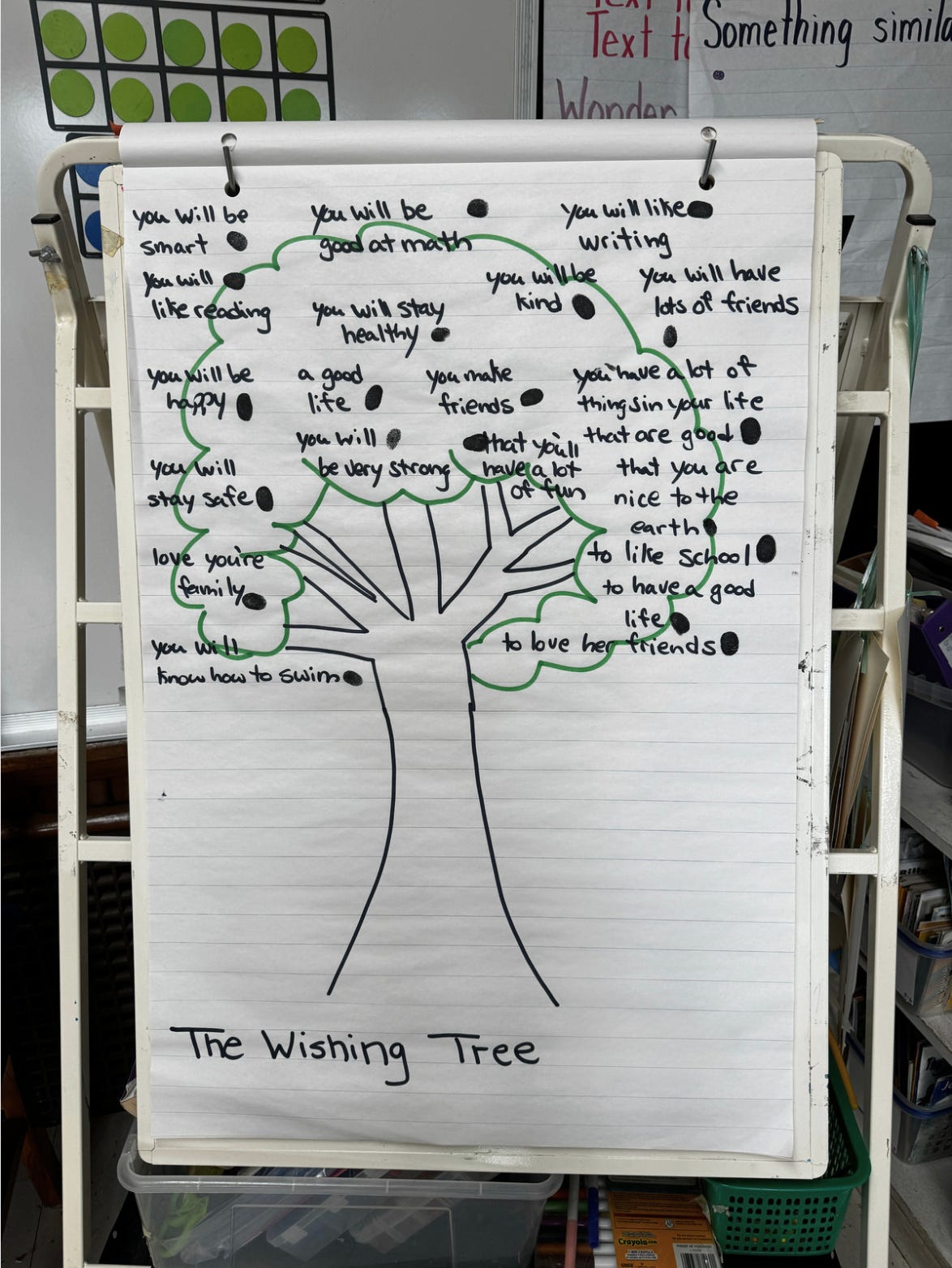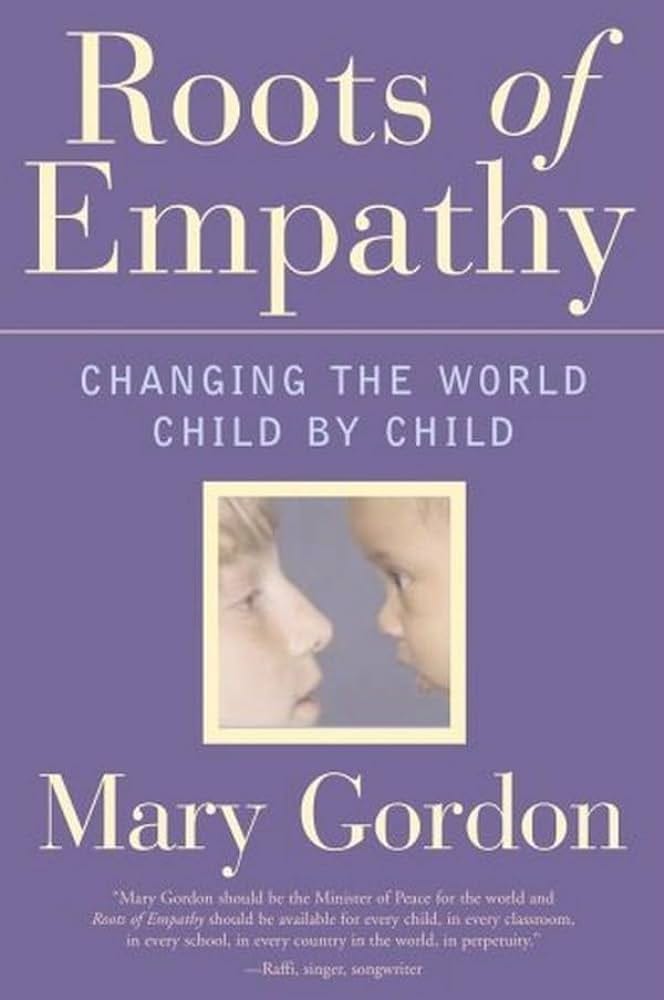Digging Down to the Roots of Empathy
Cultivating Compassion in Classrooms
Let me tell you about some magic I’ve seen firsthand. In the Roots of Empathy program, young students learn to understand the emotions of a tiny infant, unlocking their innate superpower – Empathy: an ability to connect and care.
Today during an open house at the local elementary school I got to revel in an empty classroom that reverberated with the Roots of Empathy ringing from every wall.
I’m writing to celebrate the history, success, and virtues of the Roots of Empathy, and honor the countless women who, through their dedication and compassion, are helping to create a better, more empathetic world for future generations. Their work is a powerful reminder that empathy is not just a lesson to be taught but a way of being that can transform lives and communities.
This story celebrates the unsung heroes—like my wife Amanda—who tirelessly transform classrooms into havens of compassion and empathy. These incredible women are shaping a kinder, more connected future through the power of emotional literacy.
What is Empathy?
Bah… in thinking about writing this I was going to try and come up with my own insightful definition of empathy. But Mark Ruffalo and Murray can do it WAY better than me.
In a world where empathy can often seem like a scarce resource, Mary Gordon’s "Roots of Empathy" program stands as a beacon of hope and humanity. Since its inception in 1996, this innovative educational program has been planting the seeds of empathy in classrooms worldwide, fostering emotional literacy and reducing aggression among children. The program's success is a testament to the visionary leadership of Mary Gordon and the wonderful women who bring it to life in classrooms every day.
Roots of Empathy is about guiding children to discover their innate superpower: empathy. It’s a mysterious gift shared by all human beings, maybe all creatures great and small – the connection we have to each other.
Roots of Empathy is typically taught to children in kindergarten through eighth grade, ages 5 to 13. The program is designed to be developmentally appropriate for each age group, ensuring that the lessons and activities are tailored to the specific needs and understanding levels of the children.
Through the program, school children are introduced to a neighborhood infant who visits their classroom throughout the year. As they observe and interact with the baby, they learn to intuit the baby's emotions—whether it's joy, curiosity, or discomfort—even though the infant has no words to communicate. This remarkable superpower ability to "read" the baby's feelings highlights their natural empathy. The children are often astonished at their own incredible power right from the start and are inspired to learn more about this magic ability. The program then challenges the children to harness this superpower in other areas of their lives, encouraging them to use their empathetic insight to understand and support their peers, resolve conflicts, and contribute to a more compassionate community.
The Birth of a Vision
Mary Gordon, a renowned Canadian educator and social entrepreneur, founded Roots of Empathy with a simple yet profound goal: to create a more compassionate society by fostering empathy in children. Gordon believed that empathy could be taught, and she devised a program that would bring babies into classrooms to help children understand and connect with the emotions of others. This innovative approach was grounded in the idea that emotional literacy and empathy are critical skills that can be nurtured from a young age.
A Program Rooted in Research
Roots of Empathy is built on a robust foundation of research in child development and psychology. The program's core revolves around a series of classroom visits by a neighborhood infant and parent, accompanied by a trained instructor. Over the course of the school year, students observe the baby’s development and engage in discussions about their feelings and observations. This unique interaction helps children identify and reflect on their own emotions and those of others, fostering a deeper understanding of empathy.
With ever smaller families in the modern world and people living more disconnected lives, fewer and fewer children get to share the most natural of human experiences - nurturing and living with an infant. Connecting children with infants early in life has broad-reaching implications and impacts.
Success Stories from Classrooms Around the World
The impact of Roots of Empathy has been profound and far-reaching. Studies have shown that children who participate in the program exhibit increased empathy, reduced aggression, and improved social behavior. In schools from Canada to New Zealand, educators have reported a noticeable transformation in classroom dynamics and student interactions.
Students become more considerate and supportive of one another after participating in the program. Similarly, bullying incidents decrease and an overall improvement in school climate follows. These success markers are not isolated cases; they are echoed in countless classrooms across the globe, highlighting the universal appeal and effectiveness of the program.
The Unsung Heroes: Women of Roots of Empathy
While the program itself is groundbreaking, its success would not be possible without the dedication and passion of the women who bring it to life in classrooms every day. These educators, often volunteers, undergo rigorous training to become certified instructors. Their commitment to nurturing empathy in children is evident in their tireless efforts and the strong relationships they build with their students.
These women are more than just instructors; they are mentors, role models, and advocates for a kinder, more empathetic world. They create safe and inclusive learning environments where children feel valued and heard. Through their guidance, students learn to appreciate diversity, practice kindness, and develop the emotional intelligence needed to navigate the complexities of life.
I am incredibly proud of my wife Amanda and her tireless dedication as a Roots of Empathy classroom educator. I see firsthand the profound and lasting impact she has on each class of children she works with. Through her patience, kindness, and unwavering commitment, Amanda helps students discover their own capacity for empathy, teaching them to understand and share the feelings of others. Her work not only transforms the children she teaches but also fosters a more compassionate and connected community. Amanda's efforts leave an indelible mark on every young life she touches, and I am endlessly inspired by her passion and dedication.
Celebrating the Virtues of Roots of Empathy
Roots of Empathy is a testament to the power of education to transform lives and shape the future. By fostering empathy in children, the program helps build a more compassionate and connected society. The virtues of the program are the ones we need most:
1. Emotional Literacy: Children learn to recognize and articulate their feelings, leading to better self-regulation and mental health.
2. Empathy: Students develop the ability to understand and share the feelings of others, fostering a more inclusive and supportive community.
3. Conflict Resolution: The program equips children with the skills to resolve conflicts peacefully, reducing aggression and bullying.
4. Social Awareness: Students become more aware of and sensitive to the needs, concerns, and experiences of others, promoting social harmony.
Looking Ahead: The Future of Empathy
As Roots of Empathy continues to expand its reach, the future looks bright for a world where empathy can be a cornerstone of education. The program's success is a testament to the vision of Mary Gordon and the dedication of the women who bring it to life. Their work reminds me that, at its core, education is about more than just academics; it is also about nurturing the whole child and fostering the qualities that make us human by learning that we already know how to understand, appreciate, and live with the fellow inhabitants of our planet.





